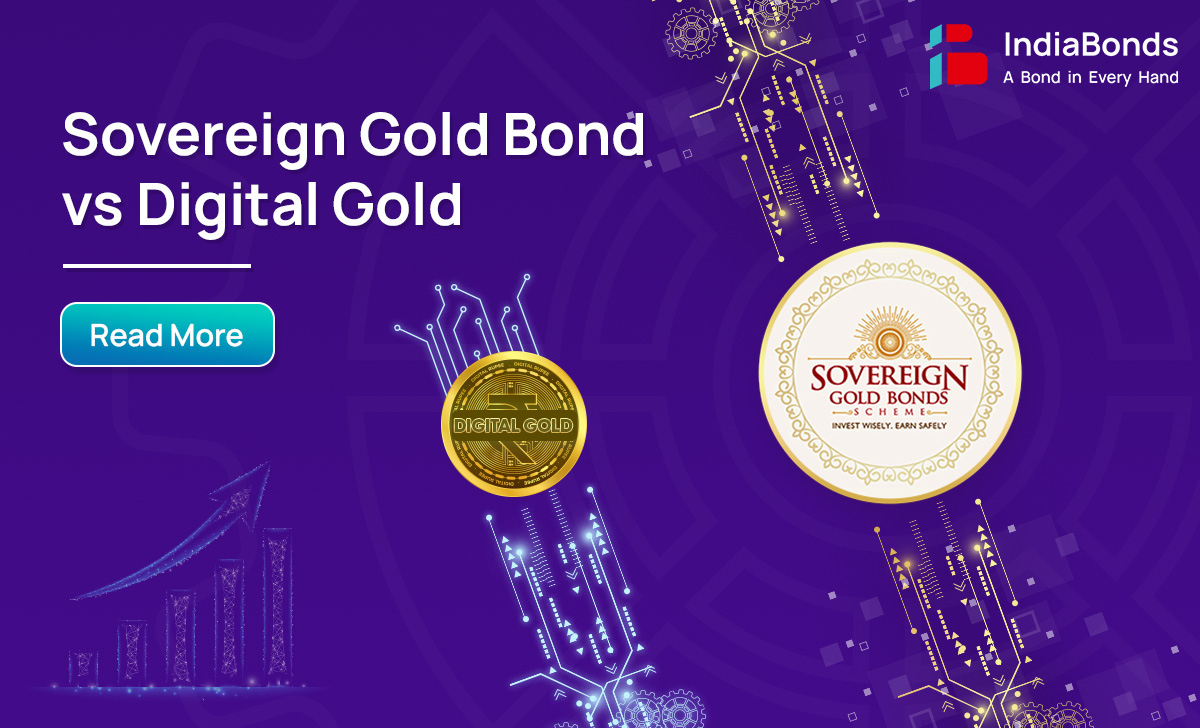Sovereign Gold Bond vs Digital Gold

In the past decade, the digital revolution in India has caused a stir. We no longer only use technology to order food, clothing and appliances, but can also purchase cars and jewellery online. Furthermore, the wealth-tech sector has seen the emergence of numerous online players offering financial products and services. Gold, which is highly valued by Indian investors, holds a special place in their hearts. As the government encourages digital gold investments and people become aware of the disadvantages of holding physical gold, it’s crucial to understand the two popular avenues for investing in gold: Sovereign Gold Bonds (SGB) and digital gold. In this article, we will explore the differences between SGB and digital gold and why SGB may be a better investment option.
What is Sovereign Gold Bond?
SGB is a government-backed scheme where investors can purchase gold bonds issued by the Reserve Bank of India (RBI). The bond’s value is determined by calculating the average closing price of gold with 999 purity over the three preceding working days of the week before the subscription period, as published by the India Bullion and Jewellers Association Ltd (IBJA) and the minimum investment is one gram of gold. The bond has tenure of eight years and investors receive an annual interest of 2.5% on their investment. At the end of the tenure, the investor can redeem the bond and the value will be based on the simple average of the closing price of 999 gold purity of the preceding three business days, as published by IBJA. SGBs are tradable on the stock exchanges and can also be used as collateral for loans.
Features of SGB:
1. SGB was launched in November 2015
2. The maximum limit per financial year for investing in SGB:- Individual and HUF: 4kg, Trusts:20 Kg
3. SGBs are held in Demat form and can be used as collateral
What is Digital Gold?
Digital gold is a new form of investment where investors can purchase gold in small denominations online for as low as Re. 1/. The investor purchases digital gold, which is backed by physical gold and kept in a secure vault. The investor can buy and sell digital gold at any time and can convert it into physical gold by paying an additional fee. Digital gold can be purchased through various online platforms and can be stored in a digital wallet.
Features of Digital Gold:
1. Digital gold provides a convenient way to invest in gold without the need for physical storage or transportation.
2. Investors can buy and sell gold in small denominations, which makes it an affordable investment option for small investors.
3. Maximum limit in digital gold – There is no restriction on the maximum quantity of gold that one can buy, although many platforms impose a limit of Rs. 2 lakh.




Difference between sovereign gold bond vs digital gold
The table below summarizes the key differences between SGB vs digital gold:
| Sovereign Gold Bonds | Digital Gold | |
| Issuer | Government of India | Private Companies |
| Tenure | 8 years | No fixed tenure |
| Interest Rate | 2.5% p.a. paid semi-annually | No interest |
| Investment | Minimum 1 gram | Minimum Re. 1/- |
| Liquidity | Tradable on the stock exchange; Redeemable from the 5th year onwards | Liquid; Can be sold through online platforms like Paytm, Gpay, etc |
| Storage | No physical storage is needed; Demat mode | Stored in digital wallets |
| Purity | Backed by RBI Gold Reserves | Gold purity is 24K |
| Safety | Regulated and monitored by RBI | Not regulated |
| Conversion to physical gold | NA | Anytime by paying an additional fee |
| Taxation | No Long-term capital gains (LTCG) tax if held till maturity and no TDS is applicable | Capital gains tax applicable |
Why SGB is a better option?
When it comes to digital gold vs sovereign gold bond, SGB has several advantages over digital gold. Firstly, it is backed by the government, making it a safe investment option. Secondly, SGB offers an annual interest rate of 2.5%, which results in a return of 20% over an 8-year period, in addition to any price appreciation. Thirdly, SGB offers a long-term capital gains tax exemption if held until maturity. In addition, when purchasing digital gold, a 3% GST must be paid, whereas there are no such charges applicable to SGBs. Furthermore, unlike the Reserve Bank of India (RBI) which closely monitors and regulates SGBs, the private entities operating in digital gold platforms lack regulation. Lastly, if you purchase SGB online, there is an extra discount of Rs. 50 per gram.
Conclusion
Investing in gold has always been popular in India and with the emergence of new investment options like SGB and digital gold, investors have more choices than ever. In the case of digital gold vs SGB, while both options have their advantages, the latter may be a better investment option due to its government backing, annual interest and tax benefits. To invest in SGBs, click here.
FAQs:
Q. What is the minimum investment in SGB?
A. The minimum investment in SGB is one gram of gold equivalent
Q. Can I convert digital gold into physical gold?
A. Yes, you can convert digital gold into physical gold by paying an additional fee.
Q. Is there any interest paid on digital gold?
A. No, digital gold does not provide any interest.
Q. Can I sell my SGB before the maturity date?
A. Yes, SGBs are tradable on the stock exchange and you can sell them before the maturity date. Although secondary liquidity is low.
Q. Are there any tax benefits to investing in digital gold?
A. No, there are no tax benefits to investing in digital gold. Capital gains tax is applicable on the sale of Digital gold.
Q. Which is better – Digital Gold or SGB?
A. Sovereign Gold Bonds (SGB) are better for long-term investments due to government backing, annual 2.5% interest, and tax benefits, including no capital gains tax if held till maturity. Digital Gold offers liquidity but lacks regulation and does not provide interest.
Disclaimer: Investments in debt securities/ municipal debt securities/ securitised debt instruments are subject to risks including delay and/ or default in payment. Read all the offer related documents carefully.



















































